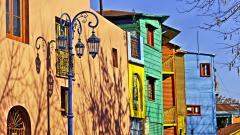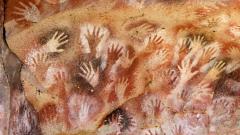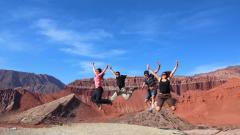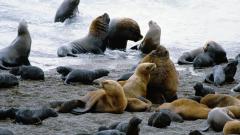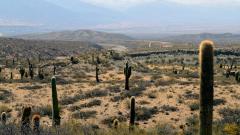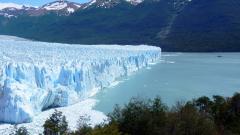 travel to Argentina
travel to Argentina
The Republic of Argentina is a country located in the southern end of South America, bordering on numerous countries: in the north with Bolivia, Paraguay and Brazil; to the west with Brazil and Uruguay; and to the west and southwest with Chile. Its coasts are lapped by the Atlantic Ocean. The country is characterized for being a mostly flat territory, except in the western zone where the landscape formed by the Andes predominates, where the highest peaks of Argentina are found.
Argentina is the second largest country in South America, behind Brazil, and the eighth largest in the world. The central region known popularly as La Pampa, is where the most important cities of Argentina are located: the capital Buenos Aires, an ideal place to make purchases and visit monuments and circuits dedicated to famous Argentine personalities; Córdoba, the second most important city in the country; and Rosario, a very important economic, cultural and leisure city in Argentina. In these cities we are offered a cosmopolitan and modern experience, while discovering their past and culture. It is very interesting to visit the Manzana and Jesuit Block and Estancias of Córdoba, composed of several buildings of a religious nature dating back to the 17th and 18th centuries. At the archaeological level, Argentina has several vestiges, see the Cueva de las Manos del Río Pinturas, a mural of rock art painted between the 12th and 8th centuries BC. To the north of the country is the city of Salta is also a touristic place in the country, full of history where tourists can make interesting circuits through the colonial city. It also offers outdoor activities thanks to the many nature reserves and national parks it has, such as the Quebrada de Cafayate, the Quebrada de San Lorenzo, the Salinas Grandes, Los Cardones National Park, etc.
Its varied geography leaves us varied landscapes throughout the country. To the north are the Iguazu Falls, located right on the border with Brazil and famous for being one of the most impressive waterfalls on the planet. Within the Argentine Patagonia, the Valdés Peninsula is a sanctuary located in the Atlantic Ocean for animal species such as southern right whales, elephants and sea lions, penguins, and armadillos among other animals. Los Alerces National Park, located in the northern Patagonian area of the Andes in the province of Chubut, boasts a lush forest, mountains covered in white and immense lakes. It is also a shelter for various species of animals and plants. In the southwest area of the province of Santa Cruz is highly recommended to visit Los Glaciares National Park, a place full of majestic glaciers highlighting the known glaciers Perito Moreno, Upsala and Onelli.
Culturally, Argentina is associated with tango, a passionate dance for couples, known throughout the world and that can be danced and enjoyed in different places of the big cities. In the field of gastronomy stand out without a doubt its roasts and beef stand out, whose quality is one of the best valued internationally. Other dishes of Argentine cuisine are empanadas, tamales salteños, choripán and milaneraa napolitana, among many others.
REQUIRED DOCUMENTATION
To enter Argentina, it is necessary to present the passport. The maximum period of stay in the country is 90 days, this period may be extended before its finalisation. The MERCOSUR and associated countries, and the member countries of EXTRAMERCOSUR and non-associated states will not require a visa to enter the country. The remaining countries do have to present both a visa and their current passport.
EMBASSIES AND CONSULATES: https://www.embassypages.com/argentina
PRINCIPAL AIRPORTS OF ARGENTINA
- Ezeiza International Airport, in Buenos Aires (Codex EZE)
- Jorge Newbery Airfield, in Buenos Aires (Codex AEP)
- Astor Piazolla International Airport, in Mar del Plata (Codex MDQ)
- Rosario Islas Maldivas International Airport, in Rosario (Codex ROS)
- Ingeniero Ambrosio Taravella International Airport, in Córdoba (Codex COR)
- Teniente Luis Candelaria International Airport, in Bariloche (Codex BRC)
- General Enrique Mosconi International Airport, in Chubut (Codex CRD)
- Puerto Iguazú International Airport, in Puerto Iguazú (Codex IGR)
- Salta Martín Miguel de Güemes International Airport, in Salta (Codex SLA)
- Malvinas Argentinas International Airport, in Ushuaia (Codex USH)
practical information
useful information before leaving
Language
Religion
Political regime
Currency
Warnings
Documentation
Vaccines
recommendations
Recommendations before traveling to Argentina
SECURITY
In general, Argentina is one of the safest countries in South America. Even so, crime towards tourists has been increasing year after year. Caution should be exercised in terms of personal belongings and foreign currency in the public thoroughfare.
Avoid walking through the suburbs of Buenos Aires and the "villas miseria" of any part of the country.
Make a photocopy of your passport and identity document and leave the originals safe in the hotel safe.
If you intend to go on excursions or practice risky sports in high mountain areas, you must be provided with regulatory material and prior planning to carry out this activity. The route to be carried out must be communicated to the competent authorities.
For the practice of risky sport, it is recommended to register at the Consulate General when arriving in the country, so that in case of accident you can communicate to your family immediately.
Caution should be exercised if we travel to desert areas such as Patagonia, as it could be isolated and without any communication in practically uninhabited places.
HEALTH
Hire a comprehensive health insurance if necessary. It should be noted that the health system is unequal depending on the region in which we are located: while in large urban centres care is optimal, in areas especially in the interior medical care is poor and lacks advanced technology.
If you travel to the tropics of the country as to the Iguazu Falls it is recommended to be vaccinated against yellow fever. In addition, you must be provided with mosquito repellent.
CLIMATE AND TEMPERATURES
The climate of Argentina is characterized by being mostly temperate, although in the northwest of the country a more subtropical climate is distinguished and in the Andes a tundra climate. In the desert region of Cuyo, temperatures can reach up to 122ºF in summer, and in winter the environment is more moderate.
BUSINESS HOURS
Business and shops hours are usually from 9:00 a.m. to 8:00 p.m. and Saturdays from 9:00 a.m. to 1:00 p.m. Banks and money exchange offices are open Monday through Friday from 10:00 until almost 3:00 p.m.
TIPS
The gratuity culture is not obligatory, but in spite of that, it is grateful to leave a tip of 10%.
The currencies can be changed in banks and exchange houses. These usually charge a commission for each transaction made. It should be noted that you can pay by credit card in most shops.
ELECTRICITY
The electrical voltage is 220 volts, and whose frequency is 50 Hz. The types of plugs used are type C and I. See if you need an adapter.
TELEPHONES OF INTEREST
The phone code is +54.
You can call the following telephone numbers in case of emergency during your stay in Argentina: police (101); firefighters (100); civil defense (103); medical emergencies (107).
TIME ZONE
UTC-3.

